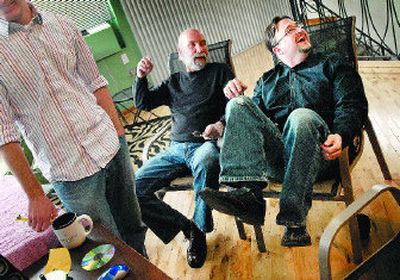Viral videos spreading

A few years ago, Joe Bereta and Luke Barats were having fun making zany videos that gradually spread across the Internet and made them Spokane’s best-known underpaid Web comedians.
These days, the Gonzaga University grads are still making wacky videos for the Web. The big difference is they’re being paid to be hilarious on behalf of companies wanting to take part in the “viral video” experiment.
Take “Cubicle War,” a two-minute production created last summer by Spokane-based Corner Booth Productions. In it, Barats and Bereta play two office software programmers who prank each other. The premise: Because they’re using software tools developed by WindwardReports, a Colorado software company, they have too much time on their hands.
The name of the product is mentioned just once, but WindwardReports couldn’t be happier with the result. Since the video came out, the software firm’s Google name searches have doubled, said Lisa Harris, the company’s marketing director.
The two performers can’t even say how many times it’s been seen on YouTube. “I guess about 2 million is what we heard,” said Barats.
Viral videos started out as a niche activity adopted mostly by indie music groups and grass-roots political activists. Today, the concept is being used by companies large and small trying to reach young, hip customers. The “viral” quality is the tendency of popular videos to be spread quickly to many users by e-mail and blogs.
“We got lucky in that we used them just before Luke and Joe became very hot,” added Harris, noting that the YouTube version of “Cubicle War” has been seen about a million times.
WindwardReports caught wind of Barats and Bereta after the vast success of their 2006 Web video, “Mother’s Day.”
For much of the past year, the two have been working on assorted videos and on a pilot TV show for NBC called “This is Cul-de-Sac.”
They continue working with Corner Booth Productions, the Spokane company that produced “Cubicle War” and which has plans to develop other viral videos using them, and other actors.
“We never want to look at ourselves as just actors,” said Bereta. The pair see themselves as creators, directors and writers who just happen to act in some of the ideas they’re developing.
Harris said they wanted a video that could reach software programmers, their main target, who generally view most forms of advertising as irrelevant. “But they do exchange ideas among themselves and send links on things they enjoy,” Harris said.
So Corner Booth was given two objectives for “Cubicle War,” Harris said. “We told them make it funny and make sure we present our value proposition” – that the company’s software tools save time.
Harris said response among developers is positive.
The jury is still out, she added, on whether viral videos really close sales. “I think we’ll continue doing things like this. It’s fun.” She added that the price was originally $2,500 for the video. Windward liked “Cubicle War” so much they sent Corner Booth a check for $3,000.
Frank Swoboda, the co-founder of Corner Booth Productions, said the company has two areas of concentration – viral spots and 30-second commercials tailored to a specific industry. In that latter group are the Spokane Teachers Credit Union TV spots seen in the area over the past year.
“Our work these days is increasingly advertising-focused, but they have to also be entertaining,” Swoboda said.
To reach younger audiences, the videos need hip and smart comedy, something “Cubicle War” delivers through dumb gags matched by a “Dilbert” oddball sensibility.
At the recent Addy Awards, handed out by the Spokane Advertising Federation, “Cubicle War” was one of 17 projects that won awards presented to Corner Booth. That video won three awards, including best of show.
Four other Corner Booth video productions, all developed by Daniel Thorpe, also won Addys. Three of them were for a West Side credit union, but all three of those relied on a documentary quality, steering clear of humor.
But Thorpe’s fourth winner, a two-minute promotional video called “Elvis 2,” went straight for the funny bone. “Elvis 2” was an Elvis spoof designed to recruit members of the Credit Union National Association (CUNA) to attend the group’s convention in Las Vegas.
If it’s too soon to predict if the viral video fad will endure, Swoboda said he doesn’t see interest in it fading fast. “This is still an effective way to reach people, if in no other way than exposing companies they’re trying to reach in different ways,” he said.